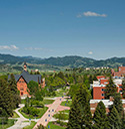Food and Nutrition Major
Dietetics Option - Becoming a Registered Dietitian Nutritionist (RDN) or Nutrition and Dietetic Technician, Registered (NDTR)
Apply to MSU | Becoming an RDN or NDTR | Curriculum
Dietetics Home | DI Application Process
Scholarships | Verification Statement
A Registered Dietitian Nutritionist (RDN) is someone who is considered an expert in food and nutrition. If you want a career that is exciting, challenging, and allows you succeed, excel, and feel good about what you do, then consider the field of dietetics. Dietetics is the high-tech science of applying food and nutrition to health. It's a vital, growing field open to creativity and opportunity; the possibilities are endless. For more information, please visit the web site for the Academy of Nutrition and Dietetics.
RDNs Work in a Variety of Different Work Settings
Hospitals, HMOs or other health care facilities, educating patients about nutrition and administering medical nutrition therapy as part of the health care team. They may also manage the food service operations in these settings, as well as in schools, day-care centers, and correctional facilities, overseeing everything from food purchasing and preparation to managing staff.
- Sports nutrition and corporate wellness programs, educating clients about the connection between food, fitness, and health.
- Food- and nutrition-related businesses and industries, working in communications, consumer affairs, public relations, marketing, or product development.
- Private practice, working under contract with health care or food companies, or in their own business. RDs may provide services to food service or restaurant managers, food vendors, and distributors, or athletes, nursing home residents, or company employees.
- Community and public health settings, teaching monitoring, and advising the public, and helping to improve their quality of life through healthy eating habits.
- Universities and medical centers, teaching physicians, nurses, dietetics students, and others the sophisticated science of foods and nutrition.
- Research areas in food and pharmaceutical companies, universities, and hospitals, directing or conducting experiments to answer critical nutrition questions and find alternative foods or nutrition recommendations for the public.
In Order to Become an RDN, Each of the Following Needs to be Completed
- Minimum of a bachelor's degree at US regionally accredited university or college and course work accredited or approved by the Accreditation Council for Education in Nutrition and Dietetics (ACEND) of the Academy of Nutrition and Dietetics.
- If you already have a bachelor's degree, you will need to have your college transcript(s) evaluated by the program director to determine what additional classes will need to be taken to complete the DPND requirements for obtaining a Verification Statement. Please see the verification statement for the specific policy.
- Completion of a ACEND-accredited supervised practice program (typically 7-24 months in length) This is also referred to as a dietetic internship. Complete and pass a national registration examination given by the Commission on Dietetic Registration (CDR).
- The RDN credential is recognized by many states as eligibility for dietetic licensure
within that state. For a complete listing go to the Commission on Dietetic Registration website. RDNs are licensed in the state of Montana through the Board of Medical Examiners.
Effective January 1, 2024, the Commission on Dietetic Registration (CDR) will require a minimum of a master’s degree to be eligible to take the credentialing exam to become a registered dietitian nutritionist (RDN). In addition, CDR requires that individuals complete coursework and supervised practice in program(s) accredited by the Accreditation Council for Education in Nutrition and Dietetics (ACEND). In most states, graduates also must obtain licensure or certification to practice. Graduates who successfully complete the ACEND-accredited DPD program at Montana State University are eligible to apply to an ACEND-accredited supervised practice program.
For more information about educational pathways to become a RDN please visit ACEND.
Nutrition and Dietetic Technician, Registered (NDTR)
DPD graduates are also eligible to take the national examination to become a Nutrition and Dietetic Technician, Registered (NDTR) without completing the supervised practice experience. The CDR website contains information about requirements for becoming a DTR: www.cdrnet.org. NDTRs work independently or as a team member under the supervision of registered dietitians in a variety of employment settings including health care, business and industry, community/public health, food service and research.

















